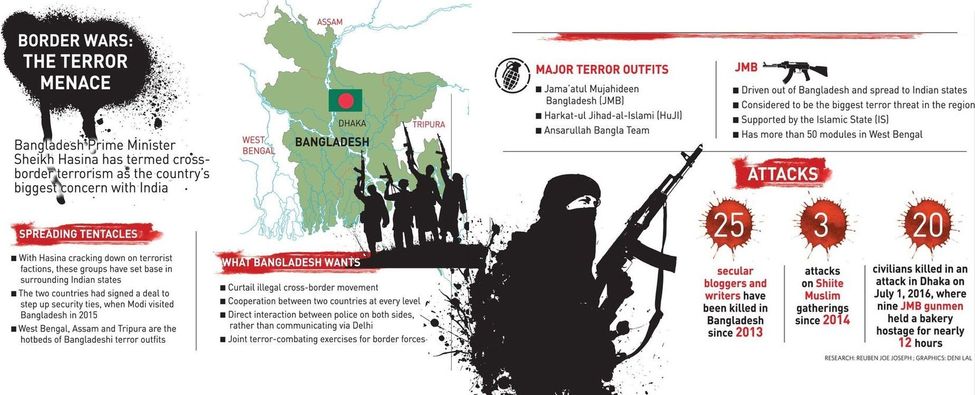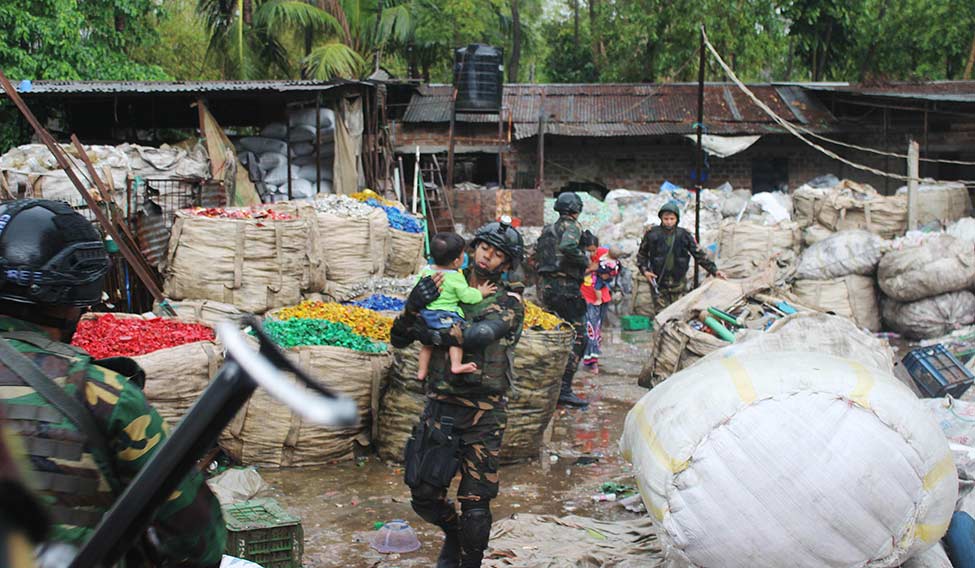It promises to be a scorcher of a summer. But, Bangladesh Prime Minister Sheikh Hasina’s twice-postponed visit to India (April 7-10) is not all about water. The Teesta River Agreement was expected to take centrestage, but, the premier has other Ts on her list—terrorism, trade and tariffs.
The trade and tariffs part is important, because India is set to export coal to Bangladesh for the first time. Bangladesh would also like a lowering of tariffs on commodities they export to India, and an easier regime on fuels they import via India.
But, the terror concern is existential for Dhaka. Bangladesh Information Minister Hasanul Haq Inu told THE WEEK: “Yes, water is important, and it will be discussed. But, the prime focus would be on cross-border terrorism. Bangladesh has done its best to not allow its land to become a grooming ground for anti-India terror groups. We want India to reciprocate.”
In mid-2016, Dhaka had submitted a report on the growing radicalism in West Bengal, Assam and Tripura. West Bengal was highlighted as a hotbed for two-organisations specifically—the Jama’atul Mujahideen Bangladesh (JMB) and the Harkat-ul-Jihad-al-Islami (HuJI). Five Indian states together share a 4,100km-long border with Bangladesh; half of it is with West Bengal.
Recently, Hasina told leaders of her party—the Bangladesh Awami League—about a twofold intrusion from India. The first was anti-Bangladesh terrorists finding shelter in India’s border states. The second was about the Awami League losing the 2001 elections. It was engineered by the secret services of India and the US, she said.
THE WEEK asked Bangladeshi freedom fighter and parliamentarian A.K.M. Rahamatulla about Hasina’s comments, and, he said, “Don’t take it as a complaint. Our prime minister wants to plug loopholes. If certain elements are in the border states, we believe India would crack down on them. India is our natural ally. [About the 2001 elections] The entire world knew that, to impress Pakistan at that time, both India and the US went against our leader.” Anti-terror operations were stepped up in Bangladesh after the attacks on the Holey Artisan Bakery in Dhaka on July 1-2, 2016. Twenty hostages, two policemen, two bakery staff and five terrorists were killed. Of the 20 hostages, 18 were foreigners. The terrorists were reportedly JMB cadre.
In the past year, Bangladesh security agencies have tracked and killed 42 terrorists in retaliation. At least 12 of them had stayed in India at various times.

“We have detailed information about the easy movement of terrorists across the border and how they stayed in India,” said M. Asaduzzaman Mia, commissioner of Dhaka Metropolitan Police. “Much of the information is classified. But, our prime minister will take up the issue during her visit to India.” Mia also heads Bangladesh’s elite Counter-Terrorism and Transnational Crime (CTTC) force.
The CTTC has had considerable success in the Dhaka attack case. The force killed Tamim Chowdhury, Canadian citizen and founder of JMB; Nurul Islam, the second-in-command, and, Saddam Hussein, a commander. Tamim and Nurul, reportedly, stayed in India to plan the attack.
Most JMB members are below 40 years of age, and everyone, except Tamim, came from Islamic Chatra Shibir, a radical students’ organisation. The banned Shibir is reportedly behind the murder of bloggers in Bangladesh. Hasina has an axe to grind with them, because they put her on their kill list.
Dhaka has a list of 24 JMB operatives that it badly wants. It has Delhi in the loop about them, and Delhi in turn has briefed the West Bengal Police. On March 7, the Kolkata Police’s special task force nabbed Mohammed Idris from Colootola area in North Kolkata. He handled JMB’s recruitment cell in West Bengal and travelled across India to gather support.
“After the attack in Dhaka, he came back to West Bengal and often visited Hyderabad and places in Karnataka,” said an officer with the Kolkata Police’s special branch. “He finally stayed with a tailor at Colootola.”
Security experts say the changing demographic has made West Bengal and Assam most vulnerable. G.M. Srivastava, former director general of police of Tripura and Assam, and an expert on Bangladesh, said, “The difference [between previous governments in Dhaka, and] this government is that it means business. Earlier, all these groups were patronised by Bangladeshi governments.
“Particular learning centres are mushrooming on the [Indian] border. The border districts, especially Murshidabad and Malda, are seeing nursing homes coming up, where Bangladeshis come and get treated. There are guest houses attached to these clinics as well.”
Another Bangladesh expert, Major General (retd) K.K. Ganguly, said, “Terrorists come to North 24 Parganas, Murshidabad, Malda and North Dinajpur districts, where they mix with people from their religion. At times, they also get political support. It happened in the Burdwan blast [October 2, 2014] where there was no idea that terrorists had rented a politician’s house.”
The presence of ultras in these areas is being blamed for the spike in communal clashes in West Bengal. Intelligence reports say there have been 12 in the past year. The report identified the affected regions as Jangipur in Murshidabad; Andul, Manikpur and Tehatta in Howrah; Chandannagar in Hooghly; Naihati in North 24 Parganas; Bhagabanpur in East Midnapore; Katwa in Burdwan (near Shimulia, where NIA unearthed sleeper cells of JMB after the Burdwan blast), and, Chanchal and Kaliachak in Malda district.
“In Tehatta local clerics stopped Sarwaswati Puja at a school; in Kaliachak, a mob burnt the police station,” said a senior intelligence officer with the West Bengal Police. “In all cases we found that outsiders were behind the attacks. They instigated the local Muslim youth and then fled. We have received many names and we are collecting more information.”
Political sparring is rife over the issue. Rahul Sinha, national secretary of the BJP, said, “We have never seen such a state government which compromises national security.” Sultan Ahmad, MP and chairman of West Bengal Minority Development Corporation Ltd, said, “West Bengal is a big state. Perhaps, these people have established hide-outs somewhere. I don’t think that they get any political support. But, I cannot say what is happening at the grass roots. I hope it is not happening.”
The West Bengal Police refused to comment on Dhaka’s charges, but it is a fact that the National Investigation Agency has warned that there are more than 50 terror modules statewide. And, they, reportedly, are picking unusual targets. For example, one is Mother House of the Missionaries of Charity.







